Homilies by Revd George Kingsnorth (Deacon)
Shortly after being ordained as a Permanent Deacon, a fellow Deacon and Creative encouraged me to turn my homilies into videos and to publish them every week. Now another friend has suggested I turn the current 75 x approx 5 minute videos in a series of post casts. So here they are. I hope you find them useful.
Episodes
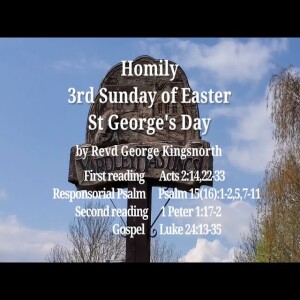
Friday Apr 21, 2023
Homily for 3rd Sunday of Easter - 23rd April 2023
Friday Apr 21, 2023
Friday Apr 21, 2023
Homily for 3rd Sunday after Easter23rd April 2023This week I happened to be in England with my mum for our 85th birthday and we went to Yardley Hastings so that she could have a meal in the Rose and Crown where she used to work in. This gave me the opportunity to go around the village and do some filming. So the footage you're seeing today is of Yardley, Hastings and Andrew's Church, where I talked about my journey last week.This week we are looking at how often we are sometimes oblivious to the way that Jesus is always with us, even when we think He's not. Each of us is on a journey from birth to death. Along the way, we accumulate knowledge of the world around us. Initially, through the interactions of our parents, whether natural or fostered, whether through the social systems imposed on us or to which we choose ourselves.Quite often we struggle to make sense of the world because of the confusion that muddies the waters and can lead us to a false sense of what treasures are that clouds our minds and draws us towards sin. We can feel helpless and a spirit can be brought low, as was seen by the two. Walking from Jerusalem to a mass, how often do we find a stranger who listens to our woes and allows us to confess What is in our heart, allows us to share our burdens, and in doing so helps to ease our pain.Jesus did not force himself upon Cleopas and his companion, possibly his wife. He simply explained to them what the Scriptures had said about how the Chosen One would become the sacrificial lamb, the same as the blood of the lamb that was used to paint the doorposts of the Israelites. So the spirit of death would pass over when the first bones of the Egyptians were taken because of their sinfulness.The LAMB of God would become the only acceptable sacrifice given once and for all. Jesus made such an impression on Clippers. He was compelled to invite the stranger to share their evening meal. It was only at the breaking of bread. Jesus was fully revealed to them. They understood and returned to Jerusalem to share with the other disciples the revelation of our Lord.In the first reading, Peter announces to those gathered why they were seeing miracles, especially the gift of tongues. For many had witnessed those filled with the Holy Spirit talking in languages they had not known before. Galilean talked in Greek, Egyptian, Latin, Aramaic and different Asian languages. We know this because Luke mentions the various people visiting Jerusalem at that time who understood the Galileans talking in their own language.In our own lives, we all face hardships and often struggle to cope. We can often feel as though we are alone, as our emotions play up, blinding us from what is around us. Some find it hard to believe when they look back on their own lives. The journey that the footprints they see are not their own, but our Lord Jesus Christ's, when he is carrying us in his arms like the man in the poem Footprints in the Sand.Like Cleapas, we need to be prepared to listen to the stranger who reveals our blind spots and shows us hidden meanings in our lives. The more we learn to use the power of prayer, the more Jesus will be revealed to us. We often think that we have to do everything on our own, but the Lord offers us on a daily basis to take our burdens from us.We only have to accept his help as he will not impose it upon us and enables us to make the choice. But when he does his only too willing to be there for us in the name of God, allowed himself to be the sacrifice so that his life-giving blood could wash away our sins, leaving us pure to be acceptable to God.Our Father. The Holy Spirit, in turn, will give us the gifts so that we can work towards bringing His gospel to others so their burdens can be lightened. If you enjoy these homilies that I put up every week, please like and share them with others so that others may be inspired by them as well. And thank you for watching.
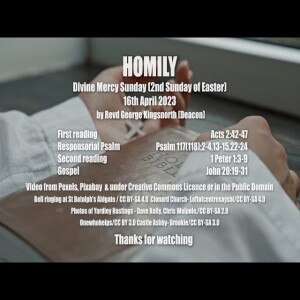
Friday Apr 14, 2023
Homily for Divine Mercy Sunday, 2nd Sunday of Easter 16th April 2023
Friday Apr 14, 2023
Friday Apr 14, 2023
Homily for Divine Mercy Sunday, 2nd Sunday of Easter16th April 2023As a child, my parents moved quite a bit. My dad was a gardener working for various Lords and Ladies. Because of the moves, it seemed to me as a child that we were being uprooted and then replanted into a new community. We would be introduced to a new school, a new group of children and a new parish. I first became aware of our local church when I was around four or five. Mum would take us to the end of the street in the village we lived in and we would going into the location Anglican church. An early recollection was discovering that behind the thick dark red curtain there were a group of people pulling the ropes to the bells. Not long after, the family moved and we didn’t visit the church often in the several villages we lived in. Then we moved to Yardley Hastings in Northamptonshire, a small village on the main road between the county town and Bedford. Mum took us again to church. As we were in the area for quite some time, I attended Sunday School, and eventually got to be a member of the local campanologists. We didn’t hang out in tents but learnt to ring the bells. So much of my understanding of Christianity came from those days. Learning about the Bible, then discovering that Matthew didn’t have the story of the annunciation because that is told in Luke’s Gospel. There was so much to learn. I was confirmed but was worried I couldn’t remember the Creed. Yet within me, I was being reassured that I would get it right the next time. Next time, you only get confirmed once. Still, I trusted. I belonged to a community. We still moved. This time from Yardley Hasting to Castle Ashby a couple of miles away, then a year or so later back to Yardley Hastings. Thankfully, I did not lose the connections with secondary school friends as I still went to the same school in Wollaston. When we return to Yardley Hastings and had a chance to go back to St Andrew’s Church, I felt as though I had come home. Why had I been so long away? I felt at peace. At sixteen I went to art college in Northampton. There I would go to breaks into a cellar coffee shop with an atheist friend and we would talk about faith. What always surprised us was how when we left we could hear 50 other students sipping their coffee and discussing God and Christianity. We experimented a few times to see if this would happen again, and each time we witnessed to the same reaction. Jesus was with us and inspiring the conversation. At 18, I went to film school in Bournemouth and again a lot of conversations were about faith. I only realised afterwards that many were Catholic. I became aware of a female presence, along with Jesus. I asked the vicar from Yardley Hastings who this might be, but he couldn’t tell me. On my 19th birthday, I travelled back to St Andrew’s in Yardley Hastings and during that service, an inner voice asked me to become a priest. That’s okay, I thought, as an Anglican Priest I can get married. But the inner voice said, actually, I want you to become a Catholic. I was a bit taken aback by this. Four years later, I found myself in Belfast being pulled into St Malachi’s Church and one of the readings said one amongst you is not of this people but had to be treated as one of their own. Before long, I found myself in Clonard Monastery talking to Fr. Hugh Arthurs about my experiences and I recognised Our Lady as the female presence I was aware of in Bournemouth. That was 38 years ago. On 16th May 1985, I was accepted into the Catholic Church, exactly a year later on 16th May 1986 I was confirmed, yes, a second time, with my future father-in-law as my sponsor. I felt as though I had finally come home to a community of people who accepted me for who I am and who cared for me. As a community, by sharing in the gifts we have been given, similarly to the early church depicted in Acts, our communities will grow, but we have to stick together and spend time with one another. We are the people Peter talked about who have not seen Christ, but we love him. We want Him to be at the centre of our lives. Like the disciples in the Gospel of John, we have been filled with the Holy Spirit and we should trust in the Lord that as long as we repent of our sins we are forgiven but if we do not they stick with us, driving a wedge between ourselves and Our Lord. None of us wants that. Thomas wanted to see Jesus’s wounds before he would believe, he was lucky that he had the opportunity to see him in the flesh. We do not, but we do believe and can feel His presence allowing us to trust in Him. What is important is that we become part of our community, part of the Body of Christ, which makes us a church. It is not the building that surrounds us that is our church but the people who are in it. We are the temple of God, each one of us. Together, we can see the many signs of Jesus’s work and by believing we will all have life through his name, Our Lord Jesus Christ.Amen.
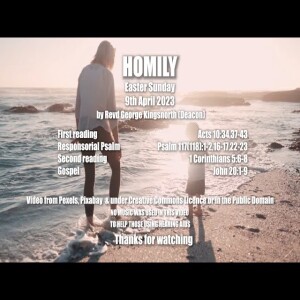
Saturday Apr 08, 2023
Homily for Easter Sunday 9th April 2023
Saturday Apr 08, 2023
Saturday Apr 08, 2023
Homily for Easter Sunday 9th April 2023We have reached a new beginning. Lent has passed, and our sacrifices have taught us a few things about our own lives, where we have failed, where things have gone wrong and need to be repaired. The season has changed. The Summer is drawing near and there is new hope. Our Lord Jesus Christ is risen from the dead.For some, especially children who have lost their grandparents, this may be hard to understand. They, in their short lives, have experienced the pain of death that comes when someone we cherish passes from this world into the next. From the perspective of a child where once the world had seemed safe, they see their parents grieve. Tears flow down their cheeks and are confused by the pain they witness in mourning. Then to be told that Jesus has come back to life, can seem hard for them to believe. They can be confused. In Matthew Gospel, we are told how Jesus visited the official’s house where his daughter had died. When Jesus told them she was only asleep, they laughed at him, but when he took her hand, she stood up. In John’s Gospel, we hear how Jesus’s friend, Lazarus had died, and he waited two more days before leaving to go to Bethany to visit Martha and Mary. Both were distressed, Jesus had not arrived sooner. His human nature also grieves as tears streamed down his face when he meets Mary. Yet he came to show God’s glory by raising Lazarus from the dead. Jesus told Martha and Mary he was the resurrection, and whosoever believed in him, even if dead would live, and those who believed in him would never die. He then asked if they believed? At the Last Supper, Jesus institutes the Eucharistic Sacrament, offering his followers bread and wine, telling them this is his body and blood. As Luke’s Gospel tells us, his body was given for us all, a memorial of him; and his blood poured out as a new covenant. Reminding us of how God’s first covenant with Abraham was to make him a father of a “multitude of nations”, symbolised through circumcision. Not long after, when Abraham in his old age was given a son through Sarah, God put him to a test, telling him to sacrifice Isaac, but moments before he did, God provide a sacrificial ram, telling him not to have the boy as God provides. The Passover feast remembers when God asked the Israelites while slaves to the Egyptians, to mark their doorposts with lambs’ blood and prepared unleavened bread for the journey ahead so that death could Passover them as his chosen people. Jesus arrived in Jerusalem to shed his blood to save all of us during this Jewish festival.Abraham had not refused to offer his son as a sacrifice, and neither did God when he gave his only begot son, Jesus, the Lamb of God, to be the only sacrifice he would accept for all the sins of the world, throughout the entire population of humanity, from the past, in the present and those still to come. But Jesus’s death was not the end. Mary Magdala had visited the tomb and was surprised to find the stone rolled back. She could see inside, but there was nobody. In John’s Gospel, she runs to find Peter and John assuming the body had been taken. While the two disciples investigate inside the tomb, Mary sees two angels who ask her who she is looking for. She turns and sees what she supposes is a gardener, not recognising the person. It is only when he speaks to her does her mind gets turned and his identity is revealed. It is the risen Lord, and she believes.In Matthew’s Gospel, Mary Magdala, accompanied by another Mary, witnesses a great earthquake and the Angel of the Lord roll back the stone. The guards are scared stiff, acting as though dead. The Angel tells the women not to fear as the crucified Lord had risen from the dead. Full of awe, the two Marys run to tell the disciples what they had seen and are stopped in their tracks as they are greeted by the resurrected Jesus, who brings a new covenant with God. Through our prayers, and listening to what we are taught in the Old Testament, and the New Testament, especially the Gospels, we can come to believe in Our Lord Jesus Christ as our personal Saviour. He wants to be near us if we are truthful and repent of our sins. Our responsibility is to pass on our faith to our children and grandchildren, to help them believe. If we have a personal relationship with Jesus, through prayer and getting to know him through the Bible, this journey can become easier, as He will take our burdens from us. In this way we can help the little ones come to understand how the Resurrected Jesus will bring life to those who believe in him. Easter has arrived and we can renew our Christian journey in faith.Amen.
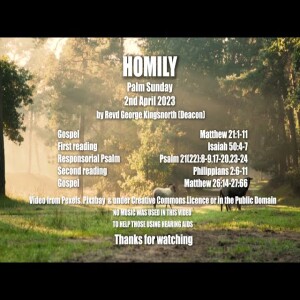
Saturday Apr 01, 2023
Homily for Palm Sunday - 2nd April 2023
Saturday Apr 01, 2023
Saturday Apr 01, 2023
Homily for Palm Sunday2nd April 2023In the two Gospels today, we see a contrast between Jesus being welcomed into Jerusalem and six days later nearly everyone abandoning him, and not wanting to be associated with him due to their fears. At the last supper, Jesus knows he is betrayed and will be taken captive. He initiates the Eucharistic sacrament and shares this with his disciples. Psalms are sung and they leave for the Mount of Olives, where Jesus says the shepherd will be struck down and his flock scattered. Still, no one believes. Yet only a short time later his words came true. Peter follows the guards taking Jesus at a distance. When others shout Peter is a follower of Jesus, he flatly denies this three times before the cock crows, only realising he had done what Jesus said he would do. Not long after, Judas full of remorse for his actions, cannot forgive himself and destroys another temple. Isaiah’s experience of following the Lord meant he was persecuted, beaten to being unrecognisable, yet offered no resistance. Echoed by Jesus’s journey towards dying on the cross. He becomes the Sacrificial Lamb, the only acceptable offering God will receive for our sins. An offering made once, for all time. In our world, this week, many leaders in new technology, have themselves worried about advances in Artificial Intelligence and the potential to cause humanity harm. They urge research and development to be halted, so governments can determine how serious the damage could be to society, jobs and our way of life. Such leaders are becoming aware of their own poor judgments. Many of us see ourselves as ‘good people’, yet we struggle to recognise where we go wrong, and what harm we cause others. It takes great courage to admit our faults, our weaknesses, and our frailties. Yet, God knows all our faults, all our sins. What he asks us to do is to confront them and be honest, especially to ourselves, and to accept that we, left to our own devices, will continue to get things wrong. If we can be honest, and not let pride enter our hearts, not accept the influential whispers of Satan taint our thoughts, and turn back to God, to accept Jesus as our Saviour, he will take hold of our burdens and lighten our loads.We have the gift of speech. We can turn out thoughts into words and express ourselves to others. There is a saying, “a problem shared is a problem halved”. In Galatians, Paul says: “God calls on Christians to disclose their problems to one another”. He also suggests each of us examine our own conduct and reminds us that we all have our own burdens to bear. As I train to become a counsellor, I see the effects of clients talking about their burdens can have a positive physical effect. This week, we come to the end of Lent. There is still time to share what burdens us in the Sacrament of Reconciliation. Jesus is waiting for us all to return to him, especially if we can come to terms with our own failings and can be honest in admitting to ourselves what they are. “Behold, your king is coming to you. Blessed is he who comes in the name of the Lord! Hosanna in the highest!”Amen.
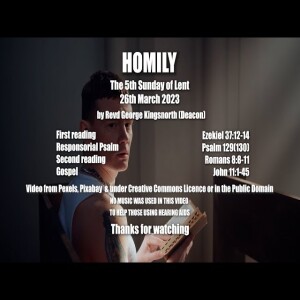
Friday Mar 24, 2023
Homily for 5th Sunday of Lent - 26th March 2023
Friday Mar 24, 2023
Friday Mar 24, 2023
Homily for 5th Sunday of Lent26th March 2023When Lent began, we were reminded that all of us will return to dust through the ashes the priest places on our forehead. From dust, we came and to dust we shall return. Since I have been ordained a deacon, I have had the honour of being with families who have lost a loved one. What many people find surprising is how on losing someone their emotions play havoc with them. For what seems to be no apparent reason tears can stream down our cheeks and deep sobbing wells up from deep inside us. For many they are embarrassed, often saying this is not how they are normally, but they are also confused and surprised by their human response to the loss. Jesus, in today’s gospel, is also overwhelmed with grief at the loss of his friend Lazarus. On hearing the news that Lazarus was ill, Jesus did not immediately go to his aid. Instead, he waited two more days before telling his disciples they would go to Judaea. His friends were worried about him because the people there had tried to stone him. He also said Lazarus was resting, so surely, he would get well. But Jesus said Lazarus was dead.On arriving in Bethany, both sisters separately raced to see him. Martha reproaches him first saying Lazarus would have lived if Jesus had been there with him but knew whatever Jesus asked of his Father would be granted. However, when Mary came up to him, she was in tears, full of emotion, Jesus’s human nature also gripped him. She had thrown herself at his feet again challenging him for not having come sooner. Jesus loved both sisters and their brother, Lazarus as though they were his siblings, and the heartache he felt gripped him also. He wept with his own grief.To many, this might be surprising because he is also God. Jesus knew the purpose behind his actions was to bring Lazarus back to life, because, as he told Martha, he is the resurrection and the life, if we believe though we might die we will live, and we will never die. When Jesus, still crying, reached the tomb he ordered the stone across the cave entrance to be removed. Though there were protests because of the expected smell, Jesus reminded them that if they believed they would see God’s Glory. When Jesus spoke to his Father, he said what he said for the people around him to believe. When Lazarus came out, he had to be unbound and set free.Though Lazarus was raised from the dead on this occasion, the bondage of this world still had a grip on him, meaning he could still physically die again. His spirit had simply been returned to his original body. Ezekiel had reminded the Israelites of how God could open their graves, how he could rebuild their bodies from their bones, sow sinews together fibre by fibre to reconstruct their whole physical body, and then breathed his Holy Spirit into them to give them life again. What Paul reminds us of is that if our focus is purely on materialist things, we will not please God. Material things are here today and gone tomorrow, they decay and fall apart. It is through sin that our bodies become dead. If we want to belong to Jesus and receive the Spirit of Christ, our focus should be on the spiritual, and the Spirit of God with find a home in us. This way, no matter if our body is dead, the Spirit will keep us alive. Lazarus’s body was not yet resurrected, because his body could still die through sin. The spirit of God had rekindled life back into him. At the final resurrection, we will rise again into an incorruptible body, full of the Holy Spirit.Until then, we will still be susceptible to death, both of our loved ones and ourselves. We will still succumb to the well of grief that comes with mourning, but we should remember that our tears are also a form of cleansing, a way of releasing the pain bound up within us. A way of refreshing our whole being. Jesus, Our Lord, and Saviour, who held the wisdom of God, still within his human nature felt the anxiety of the loss of his beloved friend, Lazarus. As we come close to the end of Lent, we still have the opportunity to repent of any sin that may keep us from being close to Jesus, and we can be reassured that he knows our pain because of his own human experiences.Jesus said, “I am the resurrection and the life. If anyone believes in me, even though he dies he will live, and whoever lives and believes in me will never die. Do you believe this?
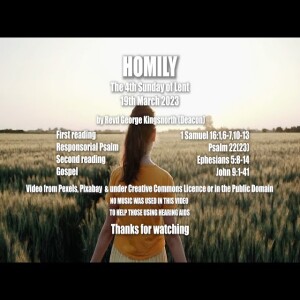
Saturday Mar 18, 2023
Homily for 4th Sunday of Lent - 19th March 2023.
Saturday Mar 18, 2023
Saturday Mar 18, 2023
Homily.4th Sunday of Lent19th March 2023.Part of the counselling process involves sitting down with a client, initially to listen to their story about the issue they have. To allow the client to do this the counsellor has to be non-judgmental, totally open and real towards the client, and show them empathy. The difference between empathy and sympathy is with empathy the counsellor shows compassion and understanding towards the client, whereas sympathy is more about having pity towards the person and tends to be more about being grateful you don’t have the same problem. As the client goes through their story, the counsellor relates back to what they had been told to gain a sense of whether they had picked up the story from the client correctly. On hearing the story related back, the client has the opportunity to see if the story is right but they also get to hear their story from another person’s perspective. As the process goes on, the client also gets to see where they have blind spots and are able to look at the problem from a different point of view. In many cases, it can be like a light bulb going on, a Eureka moment where something which had been hard for them to fathom suddenly becomes crystal clear. Jesus sees the blind man. From birth, he has had no way of looking at the world but has had to use his other senses. His hearing would be more astute and the sense of smell and touch would be heightened to compensate for the loss of sight. The Pharisees are more interested in tripping Jesus up, their focus is on building up evidence against Jesus because they see him as a threat. They are more concerned with finding out who was more sinful, the blind man’s parents or the blind man, simply because for them someone had sinned to cause the affliction.Still, Jesus’s focus was on how to relieve this man and restore him to full health. He was more concerned with how to help a person in need. When questioned, Jesus’s reply was simply that no one had sinned. The man’s blindness was a way of showing how Jesus had come into the world to do his Father’s will. While the night was not upon him, meaning the time left before his crucifixion, Jesus would work as He was the light of the world. So he made a paste in the dirt, rubbed it on the man’s eyes and told him to wash it off in the Pool of Siloam. As the man did this, light entered through the lenses of his eyes and an image was projected onto both his retinas. A signal would have been sent along his optic nerves to his brain to turn the image upside down so he could see things correctly. It may have taken him a moment or two to adjust to this new sensation. The flood of movement, colour and trying to identify what was happening before him, from the perspective of two eyes, allowing him to sense depth. All of this many of us simply take for granted as being normal. It might be like going to the cinema, the lights go out and we wait in anticipation for the images to explode onto the screen in from of us, so we can enjoy the thrills of a movie over several hours. Our senses through sights and sounds would be excited by the experience.However, the Pharisees are left a little like the bystander outside who may feel the vibrations of audio but not really understand what they meant and be completely in the dark about what is going on. They have no sense of context and meaning because they are standing in the dark.Without Jesus, we are like those who remain outside the cinema, lost in the darkness. Jesus is the light of the world, and when the light is shone on us the darkness flees and everything about us is revealed, including the things we are ashamed of. And like the person in counselling who gets to see their blind spots, they now have the capability of looking for solutions to their issues. Yet, they can only do this if there is a light shining in the first place. If we accept Jesus into our lives, he will shine his light on us, he will help us to work through the problems we face, and reveal to us the solutions we are after. Jesus will make things clear for us to see so that we do not stumble and get hurt. He is the shepherd who will guide us through the valley of darkness, leading us towards all things that are good for us. If we push Jesus away, the light will go out and we will be left to blindly stagger in the dark. Jesus loves us as we are and wants us to be in his presence. Without him, we can easily fall into the wrong path because of the darkness, but with him beside us, the path becomes clearly defined and we can take the right course. We are asked to wake up from our sleep. Rise up from the dead and Christ will shine on us.
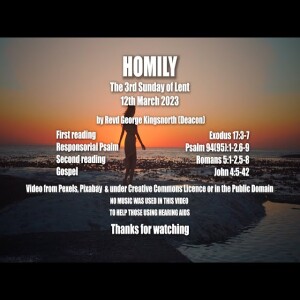
Friday Mar 10, 2023
Homily for 3rd Sunday of Lent 12th March 2023
Friday Mar 10, 2023
Friday Mar 10, 2023
Homily for 3rd Sunday of Lent12th March 2023Do you judge a book by its cover? Or go on first impressions? And if what you see initially is something you don’t like, where have those thoughts come from? On what principles or rules have you used to make these judgements? These can be tough to answer especially if the situation is a life-and-death one, and there is the potential for some kind of danger. However, what if the situation is a bit more ordinary and you still find yourself making such judgements?It’s a hot day. The sun beats down. Most people have found the shade for a while, perhaps for a siesta. A woman makes her way to a well a mile and a half outside the town, to collect some water. She carries a pitcher, a heavy bucket, and a long rope, well over a hundred foot long, so the bucket can reach down to the water. From her perspective there is no one there, so she is relieved. Then as she gets closer, there on the other side of the well sits a man. At first, she’s a bit panicked. In this day and age, men and women don’t gather together, not unaccompanied. She is hesitant, but it is hot, and she needs the water. It’s a long walk to the town in the heat to go back empty-handed. Plucking up courage she pushes on. She ties the bucket to the rope and throws the bucket down the well. There is a splash. The man turns round. “Give me a drink.”The young woman is startled. “What? You are a Jew, and you ask me, a Samaritan, for a drink?”At this moment, not only is there a man and a woman at the same well but he is Jewish and she a Samaritan. Each is from different groups that normally do not associate with each other. So, we have several conflicts in play. Yet, the conversation between this particular Jewish man and Samaritan woman, is the longest recorded dialogue between Jesus and another person in the New Testament. Jesus had simply asked for some water but in the conversation, he is offering the Samaritan woman living water that once taken, a person would never thirst again. We discover, the Samaritan woman is not married but has had five previous husbands. The man she lives with she is not married to and she would have been considered an adulterer. In another story, Jesus is teaching in the temple, when a crowd interrupt him, to bring him a woman accused of adultery they claim should be stoned according to Mosaic Law. Jesus begins to write on the ground and when the men persisted as a way to test Jesus, he says to them, “If there is one of you who has not sinned, let him be the first to throw a stone at her”.One by one they walk away. Jesus is not prepared to condemn her either, but simply tell the adulterous woman not to sin anymore.Likewise, with the Samaritan woman, who is truthful with him, when she tells him the current man is not her husband. As Jesus had revealed her inner secrets, the Samaritan woman recognised him to be a prophet but is confused because Jews and Samaritans worship in different places. Jesus tells her: “True worshippers will worship the Father in spirit and truth”. Her response is that the Messiah, Christ will reveal everything. Jesus says, “I am he.”Realising Jesus has revealed everything about her, she eagerly races of to bring others to him and share in what she has learnt. She is confident that her story will convince others and many Samaritans come to Jesus to see and hear their saviour for themselves.Jesus did not condemn either of the two women but simply gave them a chance to repent and be forgiven. In both situations, Jesus has shown true love to these women and forgiven them. Whereas, both women felt that the systems they lived under would rather see them dead for the perceived wrong done. At every opportunity, in both the Old and New Testament, God seeks for us to return to him, and through love is prepared to forgive us our sins. So much so that His only begotten Son came into this world as a Man to die on a Cross, taking on all our sins, so we can be forgiven. Yet, once we have realised what our sin is, we must turn away from it. At times, we will fall, but if our desire is to be with Jesus he will be forgiving, as long as we are truthful.It is only when we deliberately turn away and continue to do what we know is wrong, that we are the ones who reject what Jesus offers through his love. Especially, when we think we know best and judge others against our standards. Is this what Jesus wants? He welcomed the Samaritan woman and would not condemn the adulterous woman, giving them both a chance to repent and be forgiven, by being truthful to themselves and through God’s love were given the opportunity to change, bringing them closer to Our Lord Jesus Christ.Amen.
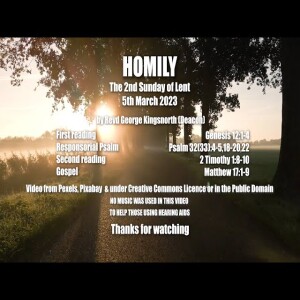
Saturday Mar 04, 2023
Homily for 2nd Sunday of Lent
Saturday Mar 04, 2023
Saturday Mar 04, 2023
Homily2nd Sunday of Lent5th March 2023Our focus today is on the transfiguration of Jesus on Mount Tabor. No-one knows when this festival first took place, but it has been celebrated in Jerusalem since the 7th century. The feast had been celebrated throughout most of the Byzantine Empire over the following two centuries. Mount Tabor can be found close to the Sea of Galilee being roughly eleven miles away. Surprisingly, Mount Tabor is just six feet taller that Slieve Gullion, around about 18 hundred feet, so the view would be similar for someone standing on top of Slieve Gullion and looking towards Dundalk Bay, as it would be standing on top of Mount Tabor to look towards the Sea of Galilee. Only a bit warmer, and perhaps sunnier. Though the views from Slieve Gullion on a clear day are awe inspiring.I have been up Slieve Gullion many times, often with my camera. My wife often tells me off for not simply enjoy the view without peering down the barrel of a lens with an image framed in a rectangle. One eye closed and the other one mostly restricted to a small shape in the centre with everything else black. In the days of the horse drawn cart, you would have said I was blinkered. In many ways, today, we no longer look into a view finder because our cameras are our mobile phones, but everything else beyond the 5 centimetre by 10 centimetre frame may as well not be there because most of our lives are absorbed by the stills, texts or videos that are displayed there. A friend of mine recently sent me an article with photograph of a crowd of people behind a barrier at an event. All but one person held up their phones, capturing images. All but one saw the whole even through a narrow lens. The one without the camera, the caption said, had really experienced the event fully, through sight, sound and feeling because they were fully present in the moment, simply being there. Not worrying about having something for the future to look back on as a simple memory. They just wanted to soak up the experience using their own, in-built senses.Jesus had taken three of his friends, Peter, James, and John up to the top of Mount Tabor. While they were all alone Jesus’s whole being was completely transformed into something most beautiful and spiritual, his face emitting so much light he shone like the sun and his clothes became as bright as white light. Beside Jesus suddenly stood Moses and Elijah talking with him. Peter was amazed to be there saying ‘it is wonderful for us to be here’. Then his mind, like so many of us got distracted and he started to think about the future. In his head he was thinking through what he would need to build three tents in honour of each of these holy men.
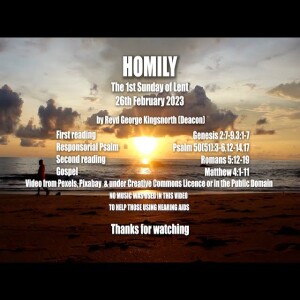
Friday Feb 24, 2023
Homily 1st Sunday of Lent - 26th February 2023
Friday Feb 24, 2023
Friday Feb 24, 2023
Homily 1st Sunday of Lent - 26th February 2023We near the end of Winter and Spring will be upon us. More light comes in through the windows and the days get longer, it is easy to see how much we have hoarded over the Winter months. The light shines into the shadows revealing what is hidden. With courage, we can start to dispose of things that may not have any real purpose or value. Most of what we buy is well-wrapped and then wrapped again. These items are quite suitable for the game of “Pass the Parcel”.But once the game has finished and the small item inside is revealed, what is left about us is all the rubbish that needs to be tidied up and thrown in the bin. We may have had a little joy but then comes the pain of clearing away.Our lives can be seen in a similar way. With Lent, we have the opportunity to see where in our lives we sin. The light shines on us and we can see what there is dragging us down. The only question is, do we recognise what those sins are, or have we rationalised them away to make them more palatable? Last Wednesday we were reminded that we come from dust and will return to dust. God modelled us out of the soil, shaped us and blew air into our nostrils so we could breathe. If you have ever seen a child being born, it is an amazing sight to see the baby take his or her first breath. For roughly 40 weeks the child has developed in the mother’s womb, surrounded by amniotic fluid. The oxygen and carbon dioxide flows through the mother’s placenta to the baby’s blood vessels, heart, and lungs helping with the child's breathing. So, although the child’s lungs are full of liquid at birth, it is only the drop in temperature that triggers the child’s system to suck in air inflating the lungs. Another miracle of life.At the other end of life, at death physically we stop breathing, our heart stops, our temperature lowers and we become still. All that we have done or accumulated remains behind. The bonds of this world are broken. We return to dust.Yet, as Christians, we believe the journey has not ended. Our spirit lives on. However, that spirit is stained with sin. Sin is what caused death according to what Paul says in his letter to the Romans. In both Genesis and Matthew’s Gospel we are shown every human being is tempted by Satan. We are all tested. Eve knew to take the fruit from the tree of knowledge would lead to death, yet she listened to the lie told to her by the serpent. Then Adam also went against what he had been told by God. Then their eyes were opened, both at the same time. And what they saw filled them with shame. When God came by, they hid in the shadows. Their actions made them not want to be in the presence of God. We know, when Jesus was baptised, the Holy Spirit descended on him like a dove, as John the Baptist witnessed. Then Jesus was led into the wilderness, and for forty days and nights, Satan attempted to do with Jesus what he had done with Adam and Eve, to drive him away from God the Father. But at every turn, no matter what the serpent suggested, Jesus, the Word of God, used scriptures as his defence. He wore the full armour of God, the belt of truth, the breastplate of righteousness, the shoes of the gospel, the shield of faith, the helmet of salvation, and the sword and prayers of the spirit. Jesus like us was being tested but did not sin. Yet, he was as human as we are.Paul tells us every single human being there has ever been, is and will be, Satan will try and tempt them away from God’s salvation by using lies and deceptions, not necessarily in big things but more often in the small things, that seem less important to us. You are in a shop; you buy some groceries handing over a ten-pound note. The cashier gives you your change and as you are about to get into the car you notice the note is ten pounds and not five pounds. It’s pouring rain, and you are cold and want to get home. Do you go back and get the correct change or drive on? I would imagine you would go back. But what if the goods cost fifty pence, you gave a pound and accidentally given a pound back as part of the change, what would you do then? Remember it is in the small details the devil gets us.We are tested every day, but it is not the test that causes the problem, but how we react to it. How our inner being is tempted to follow the deceptions before us. We may be forced to ‘do’ things against our will, but to ‘be’ what we should not be, means we are being led by our own hearts. This is where temptation comes from, from our inner being outwards, our motivation, and what drives us to do things and be someone we should not be. The way to salvation is through Our Lord Jesus Christ. We have forty days of Lent to look at what is in our lives driving us to sin. Perhaps it is not chocolate we need to give up but something else, deep within us that we need to repent. To pray for forgiveness. Use this time to ‘be’ what Jesus wants best for us so we can spend more time in his presence.
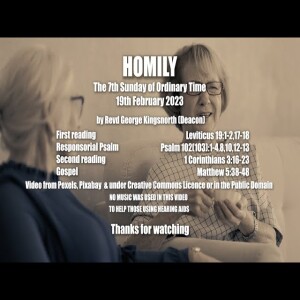
Friday Feb 17, 2023
Homily for 7th Sunday in Ordinary Time ’Love Your Neighbour as Yourself’
Friday Feb 17, 2023
Friday Feb 17, 2023
Homily for 7th Sunday in Ordinary Time19th February 2023Over the last week, I have had the opportunity to chat with many people. Each with a different perspective on world events and different philosophies. I have atheists friends who often start up conversations on Christianity knowing I am a believer. From my standpoint, I try to show how loving God is, even if it seems to be that there are horrible things going on in the world. I am asked, at times, “How can a loving God allow small children to die or be abused.” The thought horrifies me, especially as I am a father and grandfather. But is the answer so black and white? We don't often have the full story, we only know the headlines. Designed to be emotive and get us angry. Our blood boils and we can see nothing else but a horrible statement. Imagine standing around a warm fire near the city wall on a cold night. There have been rumours that a rebel leader has been arrested, a blasphemer corrupting the minds of many simple folks, the foolish ones, filling their heads with strange ideas. Thankfully the Pharisees have had him arrested and he’ll get his just reward by being crucified by the Romans. Imagine another fire burning near the side of a bombed building, once homes to thirty families, uncertain where food is coming from and where to escape. The roads are cut off by invading forces and the women are scared of how the enemy soldiers will treat them. The barbarians are mindless beasts. Subhuman according to the authorities. And that those coming from the East. On the Western side, the Allies bomb our cities and the SS pulled out leaving us the defend ourselves. My friend died in the air raids last night and I feel as though I am going out of my mind. Sadly, these were the thoughts of a young German girl, aged about 15 at the time. Let’s call her Ingrid, not her real name. It is 1945. Her brother died in his Messerschmitt fighter shot down by an RAF Spitfire over Holland. Her father was threatened by the Gestapo for helping Jews and has told his family would suffer if he continues. Then he was sent far away from his family as a Luftwaffe Major. Ingrid, like her friends, was forced into the Hitler youth. Some of her friends disappeared or were sent to concentration camps because, in their family genealogy, there was a trace of Jewish ancestry.Ingrid was scared, given a rifle and told to defend the town. She wanted to scream and run away. We are told to love our enemies, not to resist them, but to pray for them. If asked for something, we should give. If told to go one mile, we should go two. If someone needs our coat, we should give them out sweater as well. Those who wish to destroy the temple will be destroyed by God. For each one of us is the temple of the Holy Spirit. God knows our every thought, our every intention. Leviticus tells us that we must not bear hatred towards our brothers or sisters but tell them of their offence, or else we are just as guilty as they are. We are told to love our neighbour as we love ourselves. Ingrid did run away. She tried to commit suicide because of her friend's death. Yet, friends brought her back to her family. Their town was captured by the Allies. Ingrid and her family were put out of their home. Their clothes piled up in the street for the Jews who had been liberated from the concentration camps. Ingrid told me she was glad they got her clothes. She was left with next to nothing but found a great use for the Swastika flag each family was forced to have. She turned her family’s one into underwear and use curtains to produce outer clothes.After the war, Ingrid went on to become a nurse. Found herself working in England and came across the pilot who had shot down her brother. She forgave him. She met her husband, also an RAF pilot, and forgave him. In the late 1970s, Ingrid and her husband moved to Northern Ireland, where she continued to work as a nurse but also volunteered for the Samaritans, until she died at the age of 89. She told me her story in an interview, shortly before she died.Ingrid gets phone calls from people who refused to talk to her because of her German accent. She understood, was forgiving, and never passed judgment. She continued to treat everyone as her neighbour and showed them her love.Sourceshttps://www.openbeelden.nl/media/778514 Bevrijdingsbeelden Amsterdam-120155.webmhttps://www.openbeelden.nl/media/778580 - Bevrijding Enschede en Hengelo-49922.webmhttps://commons.wikimedia.org/wiki/File:Disney_Bomb_1945.ogv – - US Army, Public domain, via Wikimedia CommonsNederlands: Polygoon-Profilti (producent) / Nederlands Instituut voor Beeld en Geluid (beheerder), CC BY-SA 3.0 NL , via Wikimedia Commons - https://commons.wikimedia.org/wiki/File:Bevrijding_Enschede_en_Hengelo-49922.webmhttps://upload.wikimedia.org/wikipedia/commons/1/1e/Bomb-damaged_Nuremberg_and_Darmstadt.webm - Attribution - Rita Mack, Public domain, via Wikimedia Commons Pixabay and Pexels


